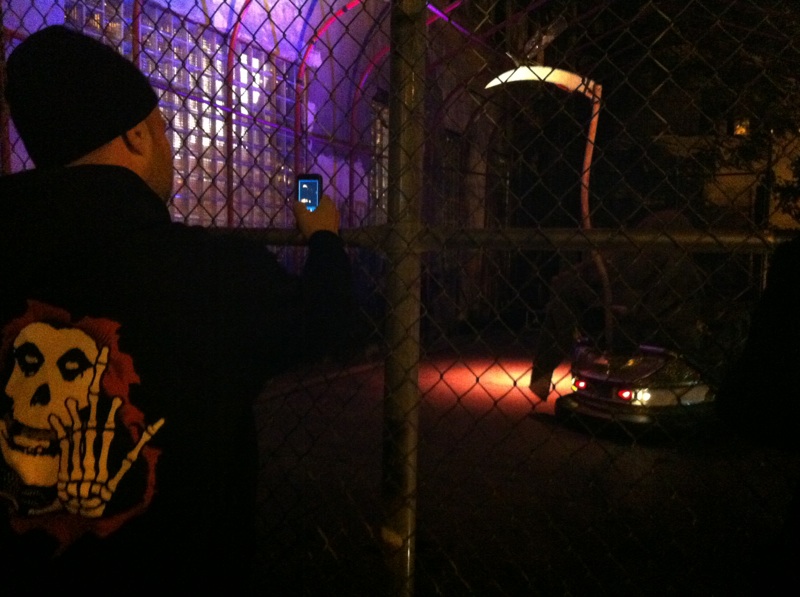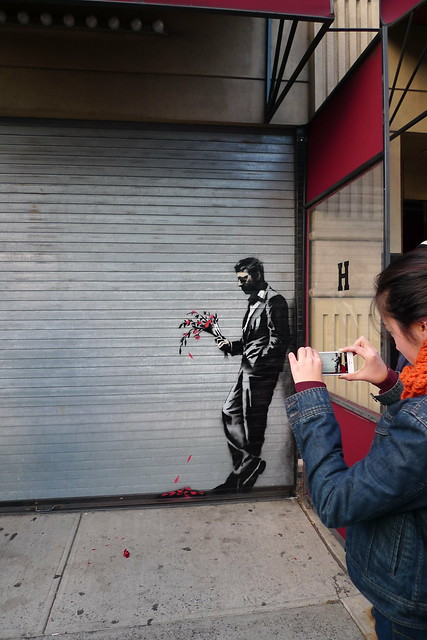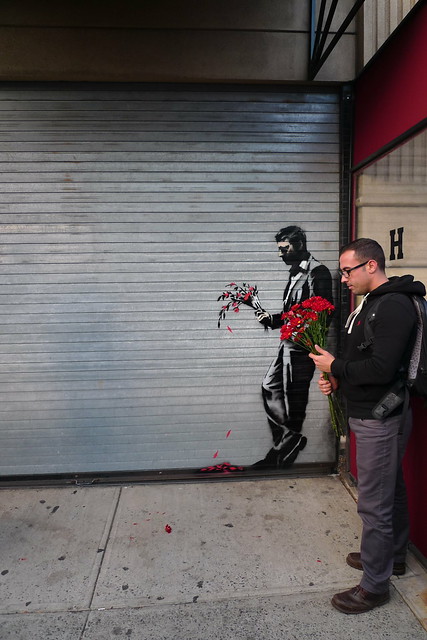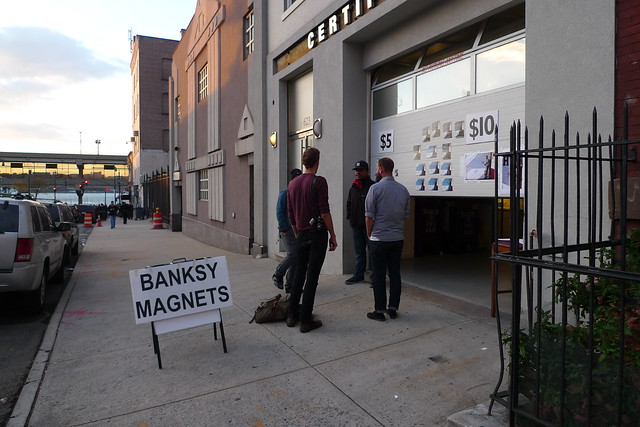
"don't we want to live in a world made of art, not just decorated by it?"
happy halloween, banksy. thanks for stopping by.

I know there’s no point in demanding that businesspeople pay artists for their work, any more than there is in politely asking stink bugs or rhinoviruses to quit it already. It’s their job to be rapacious and shameless. But they can get away with paying nothing only for the same reason so many sleazy guys keep trying to pick up women by insulting them: because it keeps working on someone. There is a bottomless supply of ambitious young artists in all media who believe the line about exposure, or who are simply so thrilled at the prospect of publication that they’re happy to do it free of charge.i haven't had to spend too much time thinking about the implications of writing for free. my literary-magazine credits are ancient history, and i am confident that turning my juvenilia over to those now-extinct journals did no serious harm to my community (i do squirm a bit over the strange poem about christina aguilera, but that's another story). this blog predates Big Web Money for personal writing, and my feelings about it haven't changed over the years; i hope it's been of use to other people, but i'm not ashamed to admit that i've written it mostly for my own benefit, and i'm comfortable with its potential financial impact on my peers as a not-for-profit public site featuring my recreational writing and photography. as for the writing i do as part of my full-time magazine job, it's work with formalized pay, bless it, and fairly uninteresting in the context of this discussion.



The car was chilly but she did not want to keep the engine running and risk drawing attention to her presence. She was also reluctant to pollute the atmosphere more than necessary. She never left the engine running when the car was stationary - it was practically the only cast-iron rule she observed as a driver.elínborg is as methodical as erlendur is erratic, and iceland's impeccable national databases and tiny population suit her style of police work perfectly: when one of runólfur's neighbors mentions she saw a man limp down the street in a leg brace on the night of the murder, she tracks down and interviews each and every male icelander of a certain age who had polio. she also finds a woman's scarf beneath runólfur's bed and notices that it smells like tandoori; alors, time to consult the one place in reykjavik that sells tandoori pots. this is a particularly lucky break, as elínborg knows it well.
Perhaps [the mystery woman] worked in a restaurant that served tandoori dishes. Elínborg knew something about tandoori cookery, and had even included some tandoori dishes in the cookery book that she had published. She had read up on tandoori cuisine and felt pretty well-informed about it. She owned two different clay tandoori pots. In India they would traditionally be heated in a pit filled with burning charcoal so that the meat was cooked evenly from all sides at a high temperature. Elínborg had occasionally buried a tandoori pot in her back garden in the authentic manner, but usually she put it in the oven or heated it over charcoal on an old barbecue. The crucial factor was the marinade, for which Elínborg used a combination of spices, blending them to taste with plain yoghurt. For a red colour she added ground annatto seed; for yellow, saffron. She generally experimented with a mixture of cayenne pepper, coriander, ginger and garlic, or with a garam masala that she made herself by using roasted or ground cardamom, cumin, cinnamon, garlic and black pepper, with a little nutmeg. She had also been trying out variations using Icelandic herbs such as wild thyme, angelica root, dandelion leaves and lovage. She would rub the marinade into the meat - chicken or pork - and leave it for several hours before it went into the tandoori pot. sometimes a little of the marinade would splash on the hot coals, bringing out more strongly the tangy tandoori fragrance that Elínborg had smelt on the shawl. She wondered if the woman they were looking for might have a job in Indian cookery. Or perhaps, like Elínborg, she was simply interested in Indian food, or even specifically in tandoori dishes. She too might have a tandoori pot in her kitchen, along with all the spices that made the dish so mouth-watering.wild icelandic herbs in tandoori, by the by, are delicious; take it from me, i've been to austur-indíafjelagið twice.
When Darwin
thought to test sonic responses of earthworms,
he requested that his children serenade
his soily jars of them: and, dutifully, an orchestra
of whistle, bassoon, and piano began
concatenating the night away in the billiards room,
its air alive with tremble and skreek,
low-blown moan and high-pitched tootle, so
racketing you'd think the row of dead wrens
and the barnacles might rise up and start capering.
The worms appeared deaf to the music; nor,
I'll bet, does this concert sound like a day
in your world—though it's of your world.
(from albert goldbarth's "jung/malena/darwin," tin house #57)

On our first date I was so nervous that I blurted out, "So, Nikki, tell me, what are your hopes and dreams?" I had hoped to disqualify her, to hear she was boring or stupid or in graduate school. I had hoped to find just one reason that I could quit staring at her, to stop imagining how much of my life I'd change just to make room for more of her in my world.***sadly, though the beautiful nikki is a lingerie entrepreneur and not a grad student, she isn't nearly compelling enough for sullivan (per gary shteyngart [who in turn must have lost a terribly high-stakes poker game to have had to deliver such a blurb],"a writer's writer. yes, he's that good."), who prefers to spend his hours out from behind the bar or the turntables with gaga, a young "musician" with extremely compelling eyes ("Her eyes sparkled like disco balls." "Her eyes were glowing like bright factory windows, her mind inside chugging along, excited by the noise of production." "She had an emptiness in her eyes and if you looked you wouldn't find her." "Her humorless eyes were pools that hovered just below thirty-three degrees Fahrenheit."). despite the sweet nothings they exchange at sullivan's obligatory twenty-fifth birthday party at the hotel chelsea (sigh), nikki leaves him to his karl lagerfeld-esque imagery ("I remembered the crisp air and the expressionless leather on all of our friends' jackets") and his lovelorn nights of blistering art theory with gaga ("If you thought she was a bit dumb, it was probably because she thought you were not that bright and didn't try to say anything over your head.")
She told me she was waiting tables ever since she quit designing lingerie for a bigger company. Now she wanted to start her own lingerie company with a partner who'd worked for Victoria's Secret. They would launch in February.
When she turned the question on me, I answered truthfully about my secret writings.**** Afterward we looked into each other's eyes like two lost sailors who first sighted land.
So mild – and, dare I say, humane – is the tendency of Ronson's satire that when he ventures out into the world of political extremists, or military fanatics, or psychiatric persecutors, he is determined to see the nebech in everyone – until they're revealed as shlemiels. But just as there was a break-point in [Ronson's] The Men Who Stare at Goats, one that occurred when the heirs to the new age military theorists actually began torturing Iraqi detainees with hideous ditties from kids' TV shows, so there's a break-point in The Psychopath Test when this reader, at least, began to think: these people aren't merely shlemiels, they're utter bastards. From then on the humour is sucked out of the text into the vacuum of a dark and cruel space.****and then it doesn't! many of the sources in his bibliography are secondary (books and magazine articles); a fact checker who handed over backup like that would be unlikely to work for me again.
[...]
Naturally, I don't discount the possibility that Ronson is only too aware of what he's up to here – he's undoubtedly a clever and thoughtful man. By constructing his books so that they start off achingly funny then at a certain juncture become naggingly painful, he does indeed force us to think more deeply about the subject at hand. This, surely, is all that contemporary satire can achieve: in a world with a relativistic moral compass, it can't enjoin us to do the right thing – for which there is no longer any consensus – but only to think about what the right thing might possibly be. That Ronson's books, rather than providing us with the material we need to think about these questions, can only indicate the further reading we should do,**** is also mandated by his authorial persona.